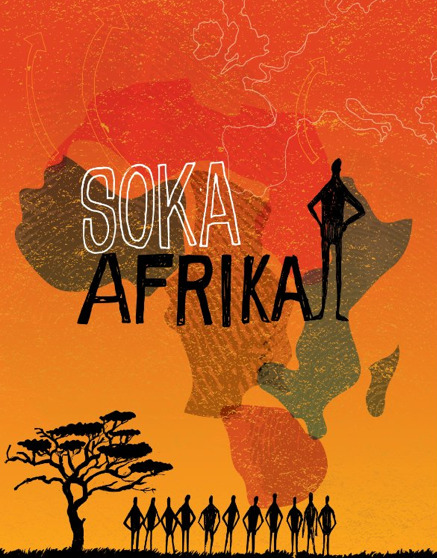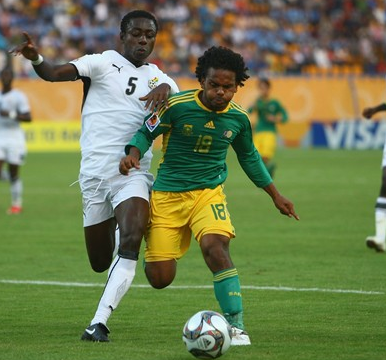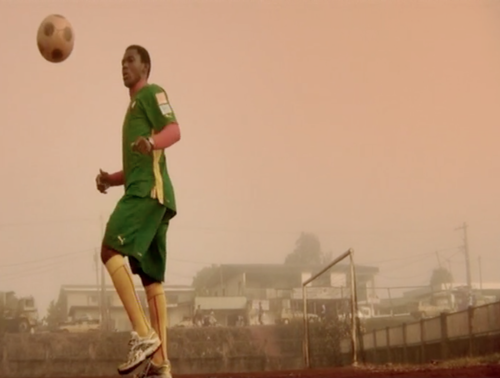Soka Afrika sews together a string of issues to uncover the world of African football trafficking
Soka Afrika sews together a string of issues to uncover the world of African football trafficking


Film Review by Eric Beard
Creating an appropriate balance between educating a viewer and watchability is one of the most difficult tasks for anyone putting together a documentary, but the means in which the tragic stories portrayed in Soka Afrika were managed kept true to an equilibrium of fine filmmaking. Not only was I fortunate enough to see the film at the legendary Tribeca Cinema for the Kicking and Screening Film Festival, but I was able to chat extensively with producers Sam Potter and Simon Laub about the art of showcasing the horrifying tales surrounding the world of African football trafficking.
The story is centered around Kermit Erasmus and Ndomo Julien Sabo, two young men who aim to catch their break and live the good life as professional footballers. Both are talented enough to do so, however, the paths they go on to reach their mutual goal could not be more different.
Kermit and Ndomo’s paths to professional football

Kermit is a South African forward that started out at Supersport United in Pretoria from a young age, a club that has a relationship with Feyenoord in the Dutch Eredivisie. He was always the superstar in the squad growing up, knocking in 40 goals in a season before joining Supersport. He was a scout’s dream, as his talent was so noticeable and clear. So without any trouble, Kermit joined Supersport and was able to use the club as a way to earn a loan move with Excelsior in Holland. His strong performances overseas also earned him a spot in the 2009 U-20 World Cup, where he was the team’s best performer. In short, Kermit Erasmus had it made with a legitimate agent that allowed him to take the best route possible for an African footballer to establish himself.
Kermit’s path, sadly, is a one-in-a-thousand scenario in the current recruiting system, as exemplified by the stark juxtaposition of Ndomo Julien Sabo’s story. Ndomo was the stand out star for his club in Cameroon, and after one match a scout approached him, promising a tryout with a big club in France. However, Ndomo had to pay the agent for the costs of the flight, the tryout, etcetera before he could have access to the riches to be found in the world of football. Ndomo’s family sold their house, sold their plot of land, just to give him this opportunity because they had so much faith in his ability and they saw it as a way out of poverty. What happened next was a scam that has been far too prevalent with young African players.

Ndomo’s tryout with a French club was going well, but then he pulled his thigh muscle and had to stop playing. The agent lost hope in Ndomo, so he took the money and ran, leaving Ndomo is Paris with nothing. No money, no food, no one to get in contact with. Nothing. He was forced to salvage for food in the winter on the streets of Paris just to survive. He called his family asking to return to Cameroon, but they told him that if he returned he could not come back and stay with his family because it would bring great shame to them for their failed sacrifice. After months on the streets, Ndomo finally was found by Jean Claude Mbvoumin, a former Cameroon player that had a successful career in Europe with AS Beauvais and a few other clubs. Jean Claude learned about this sort of trafficking and founded the French NGO Foot Solidaire, an organization hoping to save boys like Ndomo, but also prevent young Africans from falling into the same trap. Ndomo, who was still shunned by his family, was able to come back to Cameroon and regain his fitness and football ability under Jean Claude’s supervision.
Ndomo joined a club in Cameroon and played well enough to be called up to the Cameroon U20 squad, though narrowly missing out on a spot in Cameroon’s squad in the U20 World Cup. He was good enough to be in the squad, but that wasn’t the issue. Ndomo couldn’t afford the 5,000 Euros the Cameroon FA asked from him to pay for his time in Egypt for the tournament. This sort of corruption runs rampant within African football because of a lack in adequate financing. Amazingly, Ndomo kept going and was able to impress in a trial with Deportivo La Coruña and earn a contract, where he is still playing.
Looking Beyond The Individuals
The irony in following Ndomo and Kermit is that they both were success stories in the end, which is hardly representative of how the average aspiring African footballer’s career pans out. An FIFA-licensed agent in the film talks with Jean Claude in Cameroon and tells him that for every one player that has a contract with a licensed agent there are 100 that are dealing with agents hoping to capitalize on their talents, as well as their sacrifices. The main issue Jean Claude sees is that young footballers in Africa see football as their path out of poverty, so they are in awe whenever riches are talked about. Local competitions in Africa cannot compete financially with Europe’s competitions, but Jean Claude believes that there is not simply one path to success. You don’t have to go to Europe at your first opportunity, but rather you can build your reputation within African competitions and still find a way into a national team and then later into Europe. Ndomo and Kermit are both prime examples of this.
The film’s style matches the level of intensity and emotion of the stories being told. When Kermit’s U20 side is in Egypt, vibrant film work and heavy-hitting music shows not just the level of skill these players have, but also what these matches mean to them. When the film crew follows Ndomo to tell his story of what happened in Paris, the raw, subtle words coming out of Ndomo’s mouth scream to the viewer about how scarring the experience was for the young man. Every moment in Ndomo’s career has been do-or-die, and the scintillating, fast-paced film work was able to keep up and show just how much is at stake for these men every day the tie the laces on their boots to go out to train.
Soko Afrika is a film that I would recommend to everyone. It unveils a world that no one has had the courage or the resources to confront on the big screen. The film producer Simon Laub said their mission, more or less, was to capture this severe problem. Solutions, he explained, are not that simple because the whole system is so complex. You cannot blame Ndomo for his belief in himself and hoping to make it big in France. You cannot purely blame the agent that took advantage of him because he is one out of a million others just as horrible. This complexity is perhaps the biggest dilemma African football, and even football at large, will be forced to face with as globalization and corruption continue to control the beautiful game. But finally, the issue has been uncovered from all angles with the masterful planning and storytelling in this production.
You can find out more about Soka Afrika on their website, their blog, and their twitter. You can also learn about Jean Claude’s Foot Solidaire NGO here and check out the Kicking and Screening Film Festival here. Oh, and feel free to follow A Football Report on twitter as well.







